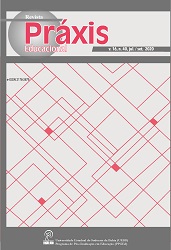TEACHER TRAINING FOR TEACHING RACIAL ETHNIC RELATIONSHIPS: A COMPARATIVE STUDY BETWEEN SCIENTIFIC PUBLICATIONS IN PARÁ (INDIGENOUS) AND BAHIA (AFRODESCENDENTE)
DOI:
https://doi.org/10.22481/praxisedu.v16i40.6835Keywords:
Teacher training, Education for ethnic racial relations, Exitus and Praxis Educacional MagazineAbstract
This study is about the training of teachers for ethnic-racial relations. The research was motivated by the intention to compare the scientific production on the subject in two different regions geographically and ethnically, one being predominantly indigenous and the other, Afro-descendant, with the perspective of unveiling what academic publications from these regions examine and suggest about teacher training for ethnic-racial relations. The guiding question was: what academic education magazines in the area of teacher training for ethnic-racial relations publish in regions predominantly afro-descendants and what they publish in predominantly indigenous regions. What are examined and suggested for this training? The regions of Santarém-PÁ and Vitória da Conquista-BA were chosen because they brought together a large number of indigenous and quilombola ethnic groups, respectively, and for having academic magazines in the field of education at local universities (Exitus - UFOPA and Praxis Educacional - UESB). This study involved research of bibliographic exploration whose data collection consisted of the search for scientific productions in this magazines in the period between 2011 and 2020 centered on the markers "teacher training" and "ethnic-racial relations". We infer that predominantly the described productions deal with the curricular adequacy for the teaching of ethnic-racial relations for the implementation of the National Curriculum Guidelines for the Education of Ethnic-Racial Relations in the light of Law no 10.639 / 03, there is no suggestion of techniques or methods for the teaching of ethnic-racial relations and all productions aimed at people of African-descent.
Downloads
References
ARAUJO, Débora Cristina de; DANTAS, Luís Thiago Freire. CURRÍCULO DES-OCULTO: outras vozes, outras epistemologias. Revista Exitus, Santarém/PA, Vol. 9, N° 4, p. 147 - 175, Out/Dez 2019. Disponível em: <http://dx.doi.org/10.24065/2237-9460.2019v9n4ID1015>, acessado em 25 de março de 2020.
BRASIL, Ministério da Educação (MEC). Diretrizes Curriculares Nacionais para a Educação das Relações Étnico-Raciais e para o Ensino da História e Cultura Afro-Brasileira e Africana. Brasília: MEC, 2004.
BRASIL, Ministério da Educação (MEC). Orientações e Ações para a Educação das Relações Étnico-Raciais. Brasília: SECAD, 2006, p. 31-74.
BRASIL. Lei N. 10.639 de 9 de janeiro de 2003. Altera a Lei N. 9.394/1996, que estabelece as diretrizes e bases da educação nacional, para incluir no currículo oficial da Rede de Ensino a obrigatoriedade da temática “História e Cultura Afro-brasileira”, e dá outras providências. Diário Oficial da República Federativa do Brasil. Brasília, DF, 9 jan. 2003. Disponível em: <http://www.planalto.gov.br/ccivil_03/LEIS/2003/L10.639.htm>. Acesso em: 07 abril de 2020
BRASIL. Lei N. 11.645, de 10 de março de 2008.Altera a Lei N. 9.394, de 20 de dezembro de 1996, modificada pela Lei N. 10.639, de 9 de janeiro de 2003, que estabelece as diretrizes e bases da educação nacional, para incluir no currículo oficial da rede de ensino a obrigatoriedade da temática “História e Cultura Afro-Brasileira e Indígena”.Disponível em: <http://www.planalto.gov.br/ccivil_03/_Ato2007-2010/2008/Lei/L11645.htm>. Acesso em: 07 de abril de 2020.
BRASIL. Ministério da Educação. Resolução nº 2, de 1º de julho de 2015. Brasília: MEC. 2015. Disponível em:<http://portal.mec.gov.br/index.php?option=com_docman&view=download&alias=17719 -res-cne-cp-002-03072015&category_slug=julho-2015-pdf&Itemid=30192>. Acesso em: 02 abr 2020.
CARDOSO, Ivanilda Amado; CASTRO, Rosane Michelli de. A ausência/presença das relações étnico-raciais nos currículos dos cursos de pedagogia: o caso da Unesp/Marília. Práxis Educacional, [S.l.], v. 11, n. 18, p. 91-115, nov. 2014. ISSN 2178-2679. Disponível em: <http://periodicos2.uesb.br/index.php/praxis/article/view/802>. Acesso em: 30 abr. 2020
CARDOSO, Zilmar Santos. As políticas de ações afirmativas para a população negra: a Lei 10639/03 e seus dispositivos legais. Práxis Educacional, [S.l.], v. 13, n. 24, p. 284-308, nov. 2016. ISSN 2178-2679. Disponível em: <http://periodicos2.uesb.br/index.php/praxis/article/view/942>. Acesso em: 01 maio 2020. doi: https://doi.org/10.22481/praxis.v13i24.942.
COELHO, Wilma de Nazaré Baía; DE BRITO, Nicelma Josenila Costa. Dez anos da lei n. 10.639/2003 e a formação de professores e relações raciais em artigos (2003/2013): um tema em discussão. Práxis Educacional, [S.l.], v. 16, n. 39, p. 19-42, abr. 2020. ISSN 2178-2679. Disponível em: <http://periodicos2.uesb.br/index.php/praxis/article/view/6358>. Acesso em: 03 maio 2020. doi: https://doi.org/10.22481/praxisedu.v16i39.6358.
GOMES, Nilma Lino. Relações Étnico-Raciais, Educação e Descolonização dos Currículos. Currículo sem Fronteiras, v.12, n.1, pp. 98-109, Jan/Abr 2012. Disponível em:< http://www.curriculosemfronteiras.org/vol12iss1articles/gomes.pdf> Acesso em: 08 de maio de 2020.
LOBO, Dalva de Souza; VILLARTA-NEDER, Marco Antonio; FERREIRA, Helena Maria. Entre omissão e preconceito racial: discurso-acontecimento. Revista Exitus, Santarém/PA, Vol. 9, N° 4, p. 176 - 203, Out/Dez 2019. Disponivel em: <http://dx.doi.org/10.24065/2237-9460.2019v9n4ID1009>, acessado em 20 de março de 2020.
MARTINS, L. M.; DUARTE, N. (org.). Formação de professores: limites contemporâneos e alternativas necessárias (online). São Paulo: Editora UNESP; São Paulo: Cultura Acadêmica, 2010
MELGAÇO, Paulo Henrique Maia; BRITO, José Eustáquio de; SILVA, Santuza Amorim da. Educação das relações étnico-raciais: reflexões sobre uma formação continuada na perspectiva de docentes. Práxis Educacional, [S.l.], v. 16, n. 39, p. 43-71, abr. 2020. ISSN 2178-2679. Disponível em: <http://periodicos2.uesb.br/index.php/praxis/article/view/6359>. Acesso em: 03 maio 2020. doi: https://doi.org/10.22481/praxisedu.v16i39.6359.
MUNANGA, Kabengele. Algumas considerações sobre “raça”, ação afirmativa e identidade negra no Brasil: fundamentos antropológicos. REVISTA USP, São Paulo, n.68, p. 46-57, dezembro/fevereiro 2005-2006. Disponível em: <http://www.revistas.usp.br/revusp/article/view/13482>. Acesso em: 30 de maio de 2020.
OLIVEIRA, Iris Verena. “HISTÓRIA PRA NINAR GENTE GRANDE” 1: currículo e formação de professores quilombolas. Revista Exitus, Santarém/PA, Vol. 10, N° 1, p. 1- 30, Edição Especial, 2020. Disponível em:< http://dx.doi.org/10.24065/2237-9460.2020v10n0ID1139>, acessado em 20 de abril de 2020.
REGIS, K. E.; NERIS, C. S. C.; RODRIGUES, S. J. Dias. O global e o local na construção de uma educação emancipatória para o ensino da história e cultura africana e afro-brasileira. Práxis Educacional, [S.l.], v. 16, n. 39, p. 91-114, abr. 2020. ISSN 2178-2679. Disponível em: <http://periodicos2.uesb.br/index.php/praxis/article/view/6361>. Acesso em: 03 maio 2020. doi: https://doi.org/10.22481/praxisedu.v16i39.6361.
SAVIANI, Dermeval. Formação de professores: aspectos históricos e teóricos do problema no contexto brasileiro. Revista brasileira de educação, v. 14, n. 40, p. 143-155, 2009. Disponível em: < https://doi.org/10.1590/S1413-24782009000100012 > Acesso em: 05 de maio de 2020, às 23:21
SAVIANI, Dermeval. Pedagogia histórico-crítica, quadragésimo ano: novas aproximações. Campinas, SP: Autores associados, 2019.
SOUZA, Maicelma Maia; CASTRO Nilma Margarida; MOREIRA, Nubia Regina. Limitações da formação docente evidenciadas na prática pedagógica: trato com o tema das relações Étnico-Raciais. Práxis Educacional, [S.l.], v. 12, n. 21, p. 339-363, out. 2015. ISSN 2178-2679. Disponível em: <http://periodicos2.uesb.br/index.php/praxis/article/view/874>. Acesso em: 01 maio 2020.
Downloads
Published
How to Cite
Issue
Section
License
Você é livre para:
Compartilhar - copia e redistribui o material em qualquer meio ou formato; Adapte - remixe, transforme e construa a partir do material para qualquer propósito, mesmo comercialmente. Esta licença é aceitável para Obras Culturais Livres. O licenciante não pode revogar essas liberdades, desde que você siga os termos da licença.
Sob os seguintes termos:
Atribuição - você deve dar o crédito apropriado, fornecer um link para a licença e indicar se alguma alteração foi feita. Você pode fazer isso de qualquer maneira razoável, mas não de uma forma que sugira que você ou seu uso seja aprovado pelo licenciante.
Não há restrições adicionais - Você não pode aplicar termos legais ou medidas tecnológicas que restrinjam legalmente outros para fazer qualquer uso permitido pela licença.












